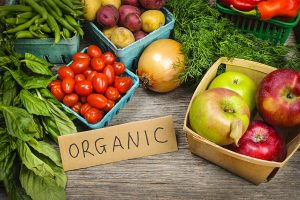Love Your Local Farmers Market!
One of the exciting things that spring has to offer, other than the great weather, is the re-opening of the local farm stands and Farmers Markets. Prior to relocating my family to the Charlotte, NC area several years ago, we spent about 10 years in Hunterdon County, NJ, located along the PA border, about 50 miles west of Newark Airport. Every July, depending on weather conditions, the peach crop from Tradition Farms would go on sale, along with loads of local fruits and vegetables. I know, I know, peaches from Jersey? Well, they were a staple in our house for many, many years, and they were tremendous.
Now that we are in Waxhaw, NC, just outside of Charlotte, we found several farm stands and Farmers Markets to choose from. Supporting local agriculture is really important to us here at Natural GREEN Lawns, and hopefully is to you as well. Here are a few simple reason why you should visit your local farms and Farmers Markets.
Supports Your Local Economy
There are scant few local farms able to compete with the big commercial farms. Supporting your local agriculture supports your local economy and helps preserve its past.
It Just Tastes Better
Mass produced produce is typically picked early, well before being vine ripened. Local farms and Farmers Markets are often able to pick the fruit when it ripens because it isn’t traveling too far before it hits the shelf, giving you a tastier product, and one that is higher in nutritional value.
Environmental Stewardship
Food in the US travels on average 1,500 miles before getting to market. Large scale agriculture also typically uses synthetic chemical fertilizers, herbicides and pesticides in a very broad way. Local farms and the food sold at many Farmers Markets don’t typically travel very far, and are often grown using methods that minimize the impact on our planet, and our health.
Of course, there are many, many more reasons to support your local farms and Farmers Markets such as connecting with your neighbors, supporting the humane treatment of livestock, tips about what you are buying and how to prepare it, and just simply the wealth of knowledge you can glean from the proprietors. Here in the Waxhaw, NC area there are several options to choose from:
Waxhaw Farmers Market
This is a “Producers Only” market which means “all of our farmers and artisan vendors, grow, raise, bake, or make the items they sell.” The farms are within 50 miles of town, the meats and eggs are cage-free and pasture raised, and the artisan foods are all natural. www.waxhawfarmersmarket.org
Grace Roots Farm
This family-owned and operated farm offer pasture raised beef, chicken, and pork, as well as free-range, brown eggs. All of their products are “raised and sold on site, granting customers the rare opportunity to see exactly where their food is produced.” How awesome is that? http://www.gracerootsfarm.com
Poplar Ridge Farms
Poplar Ridge Farm is a small, family-owned Certified Organic Community-Supported Agriculture (CSA) farm offering “produce & flower memberships, weekly online orders, an open to the public on-farm market stand, and deliveries to Charlotte metro restaurants.” http://www.poplarridgefarmnc.com
If we missed any other Waxhaw-centric farms that service the retail market, please reach out to us and we’d be glad to update this post!
Natural GREEN Lawns: We’re your local, safe organic-based lawn care company, and your alternative to the dangerous synthetic chemical fertilizer companies. We are currently serving the Union County, NC and vicinity area.
Organic Foods: Are they Worth the Money?
 When folks think about the term “organic” they often think about healthy, nutrient-rich organic foods, which is the focus of this article. We at Natural GREEN Lawns, or course, also think about natural, organically-based lawns because there are plenty of correlations between the two. For now, however, let’s focus on organic foods.
When folks think about the term “organic” they often think about healthy, nutrient-rich organic foods, which is the focus of this article. We at Natural GREEN Lawns, or course, also think about natural, organically-based lawns because there are plenty of correlations between the two. For now, however, let’s focus on organic foods.
What does “organic” really mean?
It refers to how a plant was grown and processed. In regards to food it means that the food has to have been grown and processed without the use of synthetic chemicals and chemical preservatives, has to be GMO-free, irradiation-free, and was not grown with the use of petroleum or sewage-based fertilizers. From a food standpoint, there are a lot of benefits of replacing “conventional” mass-produced food with organic alternatives. First, organic foods contain less residual pesticides than the non-organic foods you and your family eat. Equally important, organic foods are as much as 50% higher in certain nutrients, and do not contain residual antibiotics or growth hormones often found in meats.
Organic food production benefits the environment.
Organic farming significantly reduces and often eliminates underground water contamination. It does this because organic farm soil is softer and spongier due to its higher content of organic matter and microbial activity, and thus retains water better and reduces runoff. Synthetically-treated farm soil is harder and compacted, thus significantly increasing chemical runoff. Organic farms also reduce the need for harsh chemical pesticides because organic soil naturally deters unwanted pests and attracts the wildlife that helps control those pests. The same environmental benefits are achieved with an organic lawn.
Is it worth transitioning to organic foods?
The cost of organic foods, unfortunately, is typically higher than the cost of foods grown with synthetic chemical fertilizers and pesticides. If you are considering transitioning to organic foods, there are certain ones where the cost is easily justified because of the lower content of residual pesticides. Here is a list of several common foods (and there are plenty more) that should be purchased as organic: Apples, cherries, cucumbers, celery, grapes, lettuce, peppers, potatoes, spinach, strawberries, and tomatoes. Common foods that are typically lower in residual pesticides (because they are hardier and thus require less pesticides) and thus can be purchased from conventional farms include asparagus, avocados, cantaloupes, corn, eggplant, grapefruits, kiwis, onions, and pineapples, along with several others.
Who should switch to organic foods?
 Everyone should, but it’s not always in the budget. Those most vulnerable to the harmful effects of synthetic pesticides are children who, according to several studies, have been found to have a higher percentage of pesticides in their bodies. Another vulnerable group are pregnant women since (1) they pass everything on to their unborn child, and (2) these chemicals stress their already-taxed organs. For a few dollars per week more, it is well worth replacing some chemically treated foods with organic foods. Oh, by the way, they also taste better!
Everyone should, but it’s not always in the budget. Those most vulnerable to the harmful effects of synthetic pesticides are children who, according to several studies, have been found to have a higher percentage of pesticides in their bodies. Another vulnerable group are pregnant women since (1) they pass everything on to their unborn child, and (2) these chemicals stress their already-taxed organs. For a few dollars per week more, it is well worth replacing some chemically treated foods with organic foods. Oh, by the way, they also taste better!
How does this translate to having an organic lawn?
For all the same reasons mentioned above, what is good for an organic farm, and the food you eat, is also good for your lawn. Remember, your lawn is where your children play, and it’s the grass that your pets roll around in. It’s the grass that your pets (unfortunately) try to eat when you’re not looking, and it’s the soil and grass that often gets caught in your shoes and thus often ends up in your house.
Natural GREEN Lawns: We’re your local, organic-based lawn care company, and your alternative to dangerous synthetic chemical fertilizer companies.